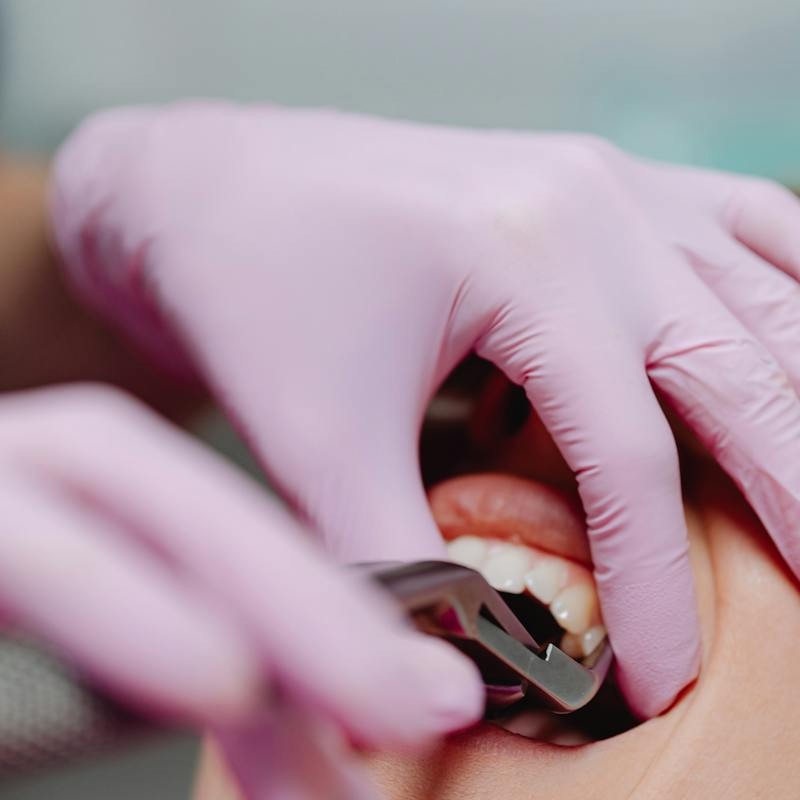Experiencing tooth pain when you bite down can be incredibly bothersome, disrupting your meals and daily comfort. Especially if this pain appears suddenly or becomes intense every time you try to eat, it’s a clear signal that something isn’t right. This type of dental discomfort can arise from a range of issues, from problems directly affecting your teeth to broader concerns related to your oral health, even involving your jaw. Let’s explore the common dental and non-dental reasons behind this pain and understand when it’s time to seek professional dental help.
Dental-Related Causes
Tooth Decay and Cavities
Tooth decay stands out as a leading cause of pain when biting down. This process begins when the enamel, the hard outer layer of your tooth, weakens. Often, this enamel erosion is due to the accumulation of plaque and tartar, sticky substances harboring bacteria. As enamel erodes, cavities, or small holes, form in the teeth and can progressively enlarge. When you bite, pressure directly impacts these cavities, triggering pain. This discomfort can feel sharp and sudden, particularly when you consume hot, cold, or sweet foods and drinks, which further irritate the exposed nerves within the cavity. If you suspect tooth decay might be the reason for your biting pain, it’s advisable to schedule a dental appointment promptly.
Dental Abscess
A dental abscess is another significant reason for experiencing pain in your mouth when biting down. Abscesses are essentially pockets of pus that develop in the mouth due to bacterial infections, often linked to tooth decay or gum disease. These are considered dental emergencies requiring immediate attention. If you think you might have an abscess, especially if it’s accompanied by symptoms like fever, chills, or a general feeling of weakness, it’s crucial to seek urgent medical care. A dental professional needs to evaluate the abscess, and antibiotics might be necessary to prevent the infection from spreading further.
Cracked or Fractured Teeth
Cracked or fractured teeth are frequently responsible for bite-down pain. These cracks can occur for various reasons, including biting down on hard objects, experiencing trauma to the mouth, or through gradual wear and tear, such as from teeth grinding (bruxism). Sometimes, a cracked tooth isn’t visible to the naked eye, but it can still cause considerable pain when pressure is applied. The pain is often sharp and might only occur when biting in a specific way or on certain types of food. Regardless of visibility, a cracked tooth always warrants a visit to the dentist for diagnosis and appropriate treatment to prevent further damage or infection.
Non-Dental Factors
Temporomandibular Joint (TMJ) Disorders
Temporomandibular Joint (TMJ) disorders affect the joint that connects your jawbone to your skull. Problems with this joint can manifest as pain not only in the joint itself but also in your teeth when you bite down. TMJ disorders encompass a range of conditions that can cause discomfort and dysfunction in the jaw joint and surrounding muscles. Symptoms of TMJ disorders can include pain in the jaw joint area, a clicking, popping, or grating sound when you move your jaw, and difficulty in fully opening your mouth. These conditions can arise from various factors, such as arthritis, injuries to the jaw, or teeth grinding.
Bruxism (Teeth Grinding)
Bruxism, commonly known as teeth grinding, is a habit that can lead to pain when biting down and is often associated with TMJ disorders. Frequently, bruxism occurs unconsciously, particularly during sleep. The constant grinding action places excessive stress on your teeth and jaw muscles, resulting in pain that can be felt when biting or chewing. Over time, bruxism can also wear away tooth enamel, making your teeth more sensitive and more susceptible to pain from pressure and temperature changes.
Impacted Wisdom Teeth
Impacted wisdom teeth, which are the last set of molars to erupt, can also cause pain when biting down. Impaction occurs when wisdom teeth don’t have enough space to emerge properly or develop normally within the mouth. They may grow at an angle, pushing against adjacent teeth. This pressure can lead to discomfort and pain, especially when you bite or chew food, as the force can further aggravate the impacted tooth and surrounding tissues.
Diagnosing the Cause
Pinpointing the exact cause of pain when biting down requires a comprehensive dental examination. Your dentist will likely use X-rays to get a detailed view of your teeth and jawbone beneath the gum line. X-rays help reveal issues like cavities, abscesses, impacted teeth, and bone abnormalities. Additionally, your dentist will conduct tests to assess the health of your teeth and gums, including checking for tooth sensitivity, visible signs of decay, and gum disease. In some instances, especially if a TMJ disorder or bruxism is suspected, your dentist might refer you to a specialist for a more in-depth evaluation and targeted treatment plan.
Treatment Options
The appropriate treatment for pain when biting down is determined by the underlying cause identified during diagnosis:
- For Tooth Decay and Cavities: The standard treatment for tooth decay involves removing the decayed portion of the tooth and filling the cavity with a dental filling. In more severe cases where the decay reaches the pulp (the inner layer of the tooth containing nerves and blood vessels), a root canal procedure might be necessary to remove the infected pulp and save the tooth.
- For Cracked or Fractured Teeth: Treatment for cracked teeth varies depending on the severity and location of the crack. Options can range from dental bonding, where a resin material is used to repair minor cracks, to fitting a dental crown to protect and strengthen a more significantly cracked tooth. If the crack extends to the tooth’s pulp, root canal therapy might be required.
- For TMJ Disorders: Management of TMJ disorders is multifaceted and can include bite guards or splints to reduce teeth grinding and jaw clenching, physical therapy to improve jaw mobility and reduce muscle tension, medications to manage pain and inflammation, and, in severe cases, surgical interventions.
- For Bruxism: Custom-made night guards are often highly effective in mitigating teeth grinding during sleep. These guards create a barrier between your upper and lower teeth, preventing grinding and reducing pressure on the teeth and jaw joint. While they can be an investment, some dental clinics offer payment plans to make them more accessible.
- For Impacted Wisdom Teeth: Extraction is frequently the recommended solution for impacted wisdom teeth that are causing pain and dental problems. Removing the impacted tooth alleviates pressure on adjacent teeth and prevents potential complications like infection. While generally safe, some dentists may exercise caution when extracting wisdom teeth in patients over 30 due to potential healing considerations.
When to Seek Professional Help
If you are experiencing persistent or recurring pain when biting down, it’s important to schedule a consultation with your dentist as soon as possible. Early diagnosis and treatment are key to preventing the underlying issue from worsening and to providing prompt pain relief. If the pain is severe, doesn’t subside, or is accompanied by additional symptoms such as swelling, fever, or signs of infection (like pus or increased redness), seek immediate dental care to address the problem quickly and effectively.
The Bottom Line
Pain when biting down should never be ignored, as it is often a symptom indicating an underlying dental or oral health problem. Understanding the potential causes, from tooth decay to TMJ disorders, and seeking timely professional dental advice are crucial steps in maintaining your oral health and overall comfort. Regular dental check-ups and cleanings are also vital for the early detection and prevention of many dental issues that can lead to biting pain. Remember, taking proactive steps in your dental care is essential for ensuring a healthy, functional, and pain-free smile for years to come.

